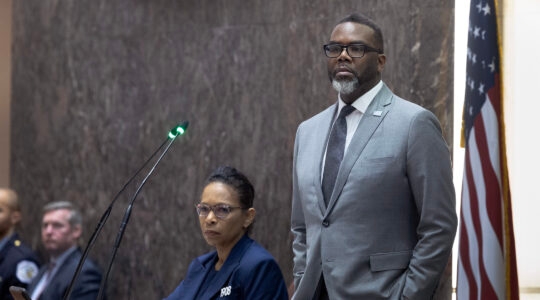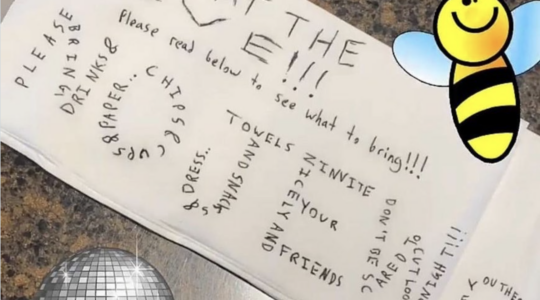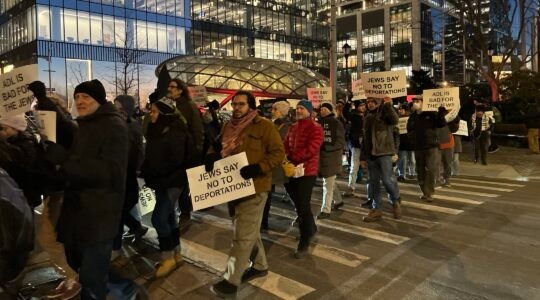SEATTLE (JTA) – Last Friday was anything but normal at the Jewish Federation of Greater Seattle.
One day before the first anniversary of a gunman’s rampage that killed one worker, 58-year-old Pamela Waechter, and seriously injured five, police were stationed at the federation as it went about its business. Many employees felt nervous and tearful.
A local rabbi led a low-key, hourlong service for the employees as TV crews came in and out of the building throughout the day. A statement sent out earlier in the week said the Jewish community should use the Sabbath “for private comfort and reflection,” and many synagogues held special services to reflect on the shooting of July 28, 2006.
The alleged gunman, Naveed Afzal Haq, 31, is being held at the King County correctional facility as he awaits trial in January. Before opening fire, he forced his way into the federation building and reportedly announced, “I am a Muslim American angry at Israel.”
In May he changed his plea from not guilty to guilty by reason of insanity soon after King County Prosecutor Norm Maleng, who had opted not to seek the death penalty, died of a heart attack. Deputy prosecutors have said they will stick with Maleng’s decision.
The five women who survived the shooting have hit plateaus in their recovery, and most have discovered that the split-second impact of a bullet will have lifelong implications.
“We’re getting to the point now where there’s probably not going to be a whole lot more recovery,” said Layla Bush, now 24, who was the youngest and most seriously injured in the shooting.
One bullet went through Bush’s shoulder and caused little damage, but the other hit several organs and was lodged in her spine until surgeons removed it in February. One of her legs has likely suffered permanent damage, a disability Bush is only coming to terms with now.
“I’m not going to be able to dance. I can’t bowl. I can’t put my pants on standing up,” she said. “It’s hard to try to focus on what I can do rather than what I can’t right now.”
But Bush has been trying to help others. Once a month she volunteers at the Harborview Medical Center’s trauma center in Seattle, where all the shooting victims were rushed after the shooting, to talk with people who have suffered spinal cord injuries. She is also hoping to attend graduate school to obtain a master’s degree in public administration that she can use to “do something good for people.”
Cheryl Stumbo, the federation’s director of marketing, was training for a triathlon when she was shot. Two bullet wounds changed her plans – but only for a year.
“I am still training for a triathlon. It actually makes me feel better,” Stumbo said. “I used to have a lot of stress relief from exercise, but the difference in mood before exercise and after exercise is really different.”
The pain that would wake her when she rolled onto her side in her sleep has mostly disappeared, but her doctors have told her it could be years before the nerve damage fully heals.
“I was in surgery five times, but I had 10 different incisions between the lung surgery and the bullet removal,” Stumbo said. “I had a lot of nerve damage in the trunk of my body.”
After the shooting, Stumbo joined the board of a local gun control organization, Washington Ceasefire.
“I come from a family where the men actually own guns and shoot guns, so this is kind of a sore topic in my family,” she said. “The whole idea is don’t let dangerous people get a hold of dangerous weapons legally and easily.
“That just seems like common sense to me, something I can really get behind, and actually my father, who’s a card-carrying NRA member, can get behind as well.”
Like many of the survivors, Stumbo was not looking forward to the anniversary of the shooting.
“The gravity of the 28th is just pulling at me,” she said. “I’ll be happy to see it be next week and have that behind us.”
Carol Goldman, 36, sustained a bullet wound to the knee. She has finished physical therapy and regained almost a full range of motion, and said she chooses to be forward-looking about the shooting.
“People asked, ‘Were you angry?’ I said, ‘No, I had enough on my plate just trying to get better.’ That’s where I expend all my energy,” Goldman said.
“I think the biggest thing for me throughout the whole thing is it’s been a learning process,” Goldman said. “A lot of the things I didn’t know before because I didn’t have experience with, and probably didn’t want to know, whether it’s navigating paperwork, pain meds, attending doctors, physical therapy, any of these things.”
Dayna Klein, who was unavailable for this story, had a bullet wound to the arm, which she had put in front of her abdomen to protect her unborn baby. Klein gave birth to a boy in October and has not returned to work. Christina Rexroad, a bookkeeper, declined comment.
During the past year, much has happened at the federation and in Seattle’s Jewish community – increased vigilance, new government funding, a remodeled federation building. The federation raised $1.2 million for building renovations and enhancements, including bulletproof glass and several intricate security measures. The renovation also included earthquake retrofits and floor plans that integrate open space and better visibility than the maze of offices of the previous layout.
Some of the money for the federation’s security add-ons is coming from the state. The capital budget included a $900,000 line item to assist in security upgrades costs for the federation, as well as for other local Jewish agencies. Several organizations have also applied for U.S. Department of Homeland Security grants to help cover increased security measures.
Some local Jewish agencies, however, have failed to take steps to better protect themselves.
“I’ve walked into two Jewish institutions in the last month where the doors were unlocked, there was nobody in visual range and anyone could have walked in,” said Rob Jacobs, regional director of the Anti-Defamation League. “Because of the heat, all of the doors were open. From the perspective of our office, we’re trying to find the factor and the motivation that will keep them vigilant.”
JTA has documented Jewish history in real-time for over a century. Keep our journalism strong by joining us in supporting independent, award-winning reporting.





